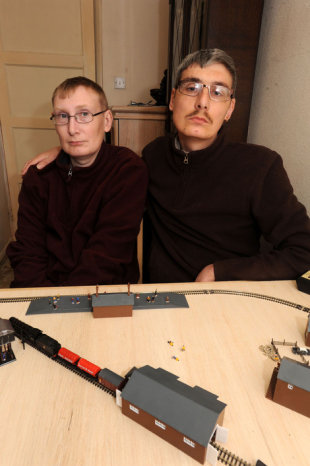Posted here on 27 November, 2012.
Real Benjamin Buttons Brothers: Matthew and Michael Clark Are Aging Backwards
By Piper Weiss, Shine Staff | Healthy Living – 5 hours ago The Clark brothers (courtesy of Channel4)By
the looks of their home, Tony and Christine Clark are raising two
rambunctious 7-year-old boys. Model train tracks and Monopoly pieces are
scattered on tables and cartoons flicker on the TV set.
The Clark brothers (courtesy of Channel4)By
the looks of their home, Tony and Christine Clark are raising two
rambunctious 7-year-old boys. Model train tracks and Monopoly pieces are
scattered on tables and cartoons flicker on the TV set.
But the Clarks' two sons are grown men who share only the same interests and emotional fluctuations of little boys. Like the character portrayed by Brad Pitt in the 2008 film "The Curious Case of Benjamin Buttons," Matthew, 39, and Michael, 42, are aging backwards.
Diagnosed with a terminal form of leukodystrophy, one of a group of extremely rare genetic disorders that attack the Myelin, or white matter, in the nervous system, spinal cord, and brain. In the Clarks' case, the condition has not only eroded their physical capacities, but their emotional and mental states as well.
Only six years ago, both brothers were holding down jobs and growing their families. Today, they spend their days in the care of their parents, both in their sixties, playing with Mr. Potato Head, fighting over Monopoly, and in rare lucid moments, struggling to understand why their lives have changed so dramatically. The 2008 fantasy movie is one of the few popular frames of reference for a very real and frightening disorder.
Before the Clark Brothers were diagnosed, they were
living independent lives. Michael served in the Royal Air Force and
later became a cabinet maker. Matthew worked in a factory and was
raising a teenage daughter. Tony and Christine, meanwhile, had retired
and moved from the UK to Spain. Then in 2007, both of their sons fell
off the radar. They stopped returning their parents' calls and texts,
and as the Clark brothers' conditions developed, their lives fell
apart.
Michael surfaced in a soup kitchen, and was referred to medical experts by social workers. After an MRI scan, he was diagnosed with the incurable degenerative disorder. Soon after Matthew received the same news. In the U.S. alone, about 1 in 40,000 children are born with a form of the neurodegenerative disease, according to Dr. William Kintner, President of the United Leukodystrophy Foundation. While some forms of the disorder are potentially treatable if discovered in the earliest stages and not all cause an emotional regression, the brothers are unlikely to be cured. "It's very difficult to do anything once progression has occurred," Dr. Kintner tells Yahoo! Shine.
 With their train set.(Courtesy of Channel4)
With their train set.(Courtesy of Channel4)As of April, when the Clarks were first written about in the British press, their mental age was 10.
"We will be out walking and things which might interest a toddler interest them, the other day we were walking home when Michael saw a balloon and pointed it out to us," father Tony Clark, told The Telegraph last spring.
Today, the brothers are even younger mentally.
"Just like small children, they wake up a lot during the night," mom Christine said in an interview published in The Independent this week. "I was up seven times with them last night."
After learning of their diagnoses, Tony and Christine returned to the UK and moved in with their sons. Their daily struggles as a family have been chronicled in a British documentary, "The Curious Case of the Clark Brothers," airing Monday in the UK.
Earlier this year, Matthew became a grandfather, when his daughter had a son. But the news for the family was bittersweet, as the Clark brothers' mental age continued to creep backwards.
"There's no return to them being cute little boys," said Christine, who regularly manages their tantrums and fights over Monopoly. "They're big strong men—and that presents a quite different set of problems."
More recently, even their physical strength began deteriorating.
"A few weeks ago, they could still manage with a knife and fork, but now that's getting too difficult for them—they get the food onto their forks, but somehow it all falls off before it reaches their mouths," she said.
Donors and genetic disorders: how much do you know?
Now walking is the next hurdle; Matthew is already confined to a wheelchair.
"The likelihood that they're on a terminal course is fairly certain, but who knows?" says Dr. Kintner, who is familiar with the Clark case but didn't meet the brothers. "If they were citizens of U.S., we'd try to get them to the National Institute of Health for diagnostic work, but in the UK the system is different. There is no comparable organization with genetic diseases, so it's a little more difficult there."
Dr. Kintner estimates there are several million cases of one of the estimated 40 types of leukodystrophies in the U.S., but an exact number is hard to pinpoint. The different forms of the disorder are still being identified and tests for each known type are still being developed. "It's going to take a long time," says Dr. Kintner. "I hope in my lifetime I see a cure for some of them."
 The widow of the late Daudi Mwangosi, Itika. PHOTO | CLEMENT SANGA
The widow of the late Daudi Mwangosi, Itika. PHOTO | CLEMENT SANGA